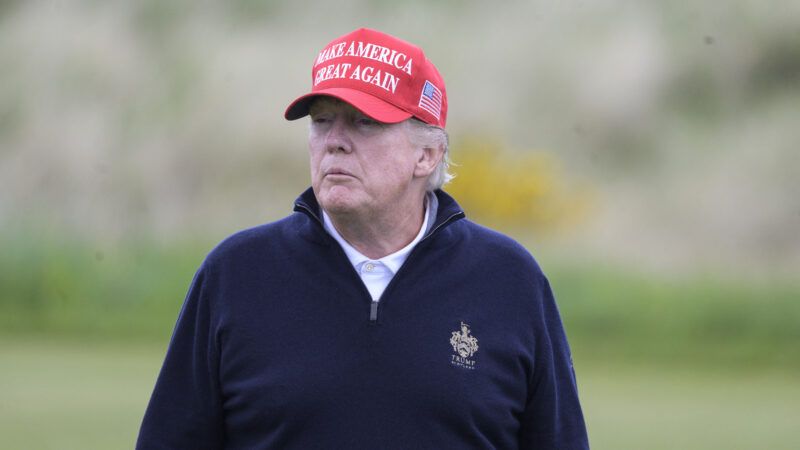Donald Trump Indicted on More Than 30 Charges in Classified Documents Case
The feds allege the former president was keeping classified documents on America's nuclear program and defense capabilities in his Mar-a-Lago resort.

Former President Donald Trump has been indicted in federal court on 37 felony charges related to hoarding boxes of classified materials at his South Florida resort.
Trump faces multiple counts of conspiracy to obstruct justice, willful retention of national defense information, and concealing documents from investigators and a federal grand jury. The indictment alleges that the classified documents included information on U.S. nuclear programs, defense and weapons capabilities, vulnerabilities, and military plans for retaliation in response to a foreign attack.
"The unauthorized disclosure of these classified documents could put at risk the national security of the United States, foreign relations, the safety of the United States military, and human sources and the continued viability of sensitive collection methods," the government alleges.
Trump and his Republican supporters in Congress say the charges are part of the corrupt weaponization of the Justice Department by Joe Biden—who also mishandled classified records—against his political rival.
Sen. Mitt Romney (R–Utah) was one of the only Republicans to defend the charges: "By all appearances, the Justice Department and special counsel have exercised due care, affording Mr. Trump the time and opportunity to avoid charges that would not generally have been afforded to others," Romney said in a press release. "Mr. Trump brought these charges himself by not only taking classified documents, but by refusing to simply return them when given numerous opportunities to do so."
While the broad strokes of Trump's, Biden's, and Mike Pence's cases of retaining classified documents are similar, Romney is correct that Trump ran head-first into the charges, even with the generous benefit of the doubt that the Justice Department gives high-ranking politicians in cases involving classified records.
As Reason's Jacob Sullum explained in January after more classified records were discovered in Biden's garage, Biden's cooperation with federal law enforcement may weigh against finding that there was criminal intent or willful mishandling:
Trump, by contrast, took thousands of government documents, including 325 marked as classified, when he left office, and he persistently resisted returning them, apparently because he considered them his personal property. That resistance included months of wrangling with the National Archives and Records Administration and incomplete compliance with a federal subpoena, which culminated in the FBI's August 8 search of Mar-a-Lago.
Unlike last week's visit to Biden's house, the Mar-a-Lago search was not consensual. It was authorized by a warrant that a magistrate judge issued after concluding that there was probable cause to believe the FBI would find evidence that Trump or his representatives had committed federal crimes. Specifically, the FBI cited statutes that make it a felony to remove or conceal government documents, retain "national defense information," and obstruct a federal investigation.
But even if the charges are ultimately a result of Trump's obstinance, it does not negate the real problems with overclassification, the general bloat of the national security apparatus, and the abuse of the Espionage Act.
Sen. Rand Paul (R–Ky.) recently noted in an op-ed that, in 2017, over 4 million Americans with security clearances classified nearly 50 million documents.
Trump's charges include violating the Espionage Act of 1917, a World War I-era law that has been used to prosecute whistleblowers who leak classified documents to the press.
The Obama administration prosecuted a record number of leakers under the Espionage Act, and the Trump administration used it as well. The Trump administration prosecuted whistleblowers Reality Winner and Daniel Hale for leaking classified documents to the press. In Hale's case, he leaked documents showing how the U.S. was killing civilians overseas with drone strikes.
Paul proposed scrapping the law altogether last year. "The espionage act was abused from the beginning to jail dissenters of WWI. It is long past time to repeal this egregious affront to the 1st Amendment," he wrote.
It was an offer that Congress, including many of the Republicans now warning of dark days for American democracy, ignored.


Show Comments (309)